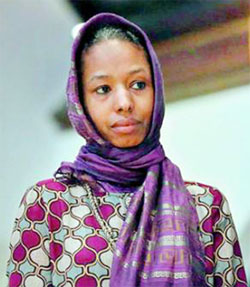Joe Williams
In a craven capitulation to anti-Muslim agitation, Wheaton College has begun termination proceedings against Dr. Larycia Hawkins, a tenured professor who attracted national attention in December by wearing a hijab during the Christian Advent period to show solidarity with Muslims.
Explaining on social media her decision to don the Islamic garb, Hawkins wrote, “I stand in religious solidarity with Muslims because they, like me, a Christian, are people of the book. And as Pope Francis stated last week, we worship the same God… As part of my Advent Worship, I will wear the hijab to work at Wheaton College, to play in Chi-town [Chicago], in the airport and on the airplane to my home state that initiated one of the first anti-Sharia laws (read: unconstitutional and Islamophobic), and at church.”
Wheaton is a private evangelical Christian college located 25 miles west of Chicago. The college was founded by abolitionist opponents of slavery in 1860.
In response to Hawkins’ actions, the college released a statement to the media declaring that the “theological implications” of Hawkins’s claim violates the Wheaton College “Statement of Faith,” which all students and faculty are required to sign.
On December 15, four days after she posted her statement, Provost Stanton Jones presented Hawkins with a document accusing her of “blasphemy,” and Hawkins was placed on paid administrative leave. On December 17, Hawkins submitted a four page theological statement re-affirming her commitment to the Statement of Faith. College officials are nevertheless moving forward with procedures to terminate Hawkins. A committee of nine tenured Wheaton professors is expected to arrive at a decision within several weeks about Hawkins’s future employment at the college. College president Phillip Ryken will then refer the professors’ recommendation to Wheaton’s Board of Trustees for a final decision.
Hawkins has received support from students and colleagues, who have denounced the administration’s justifications for her termination. On January 11, the first day of the spring semester, over 100 students staged a protest outside the school’s main chapel. Students are also continuing a sit-in, begun last semester when Hawkins was put on leave, outside the offices of Jones and Ryken.
One participant, senior Annika Bouwsma, told the Wheaton Daily Herald, “I don’t think there’s been enough transparency and I don’t think that she (Hawkins) deserves termination or leave.” Protest leader Joshua Mangis said he is hopeful that the college will reconcile with Hawkins, adding, “There’s definitely an atmosphere on campus just that this is an important thing…A lot of professors are opening class with a statement about it and encouraging students to read up on it.” One student held a sign reading “Academic rigor = academic freedom.”
A group of faculty has also registered a protest of the administration’s decision, declining to take part in a mandatory prayer service at Bedman Chapel, choosing to hold an alternative service in a nearby chapel instead. Gary Burge, professor of New Testament Studies at Wheaton, told Time, “I have seen no theological argument from the college that would deem her commitments unacceptable…[Hers] is a clear, compelling affirmation of what we believe in Wheaton’s Statement of Faith.” Benjamin L. Corey, writing for the liberal Christian news site Patheos, observed that “the glue that holds fundamentalism together is the agreement upon a common enemy to fight, and Dr. Hawkins has rejected the notion that Muslims are the common enemy.”
Internal emails from the college administration appear to confirm that the move against Dr. Hawkins is a concession to the anti-Muslim hysteria that is being whipped up by the political establishment and the media. In one email, Jones acknowledged that Hawkins’ statement was “innocuous,” but complained, “Articles are already being written in a variety of news sources, and the media are pounding on our door asking for comments about our faculty who are endorsing Islam.” In another email, he wrote that “her theological comments are being taken up as an endorsement of Islam.”
This episode at Wheaton College is part of a broader trend on college campuses of chilling and suppressing dissent. In October, George Washington University student Ramie Abounaja was forced by police to remove a Palestinian flag he had hung from his dorm window. The school was unable to cite any regulation he had violated and eventually apologized under threat of legal action from a Palestinian civil rights organization.
In 2014, the University of Illinois rescinded a job offer to Professor Steven Salaita after he criticized the Israeli government on Twitter. On January 7, New Jersey high school student Bethany Koval was called to the principal’s office because a fellow student reported her tweets in support of Palestinian rights as “bullying.” She alleges that she was threatened with prosecution under state anti-bullying laws, denied access to legal counsel, and forced to sign a statement against her will. She has since retained a lawyer.
In 2012, Wheaton College joined a number of other religious institutions in a lawsuit against the Obama administration over the Affordable Care Act’s requirement that health insurance for employees or students include contraceptive coverage. The Obama administration had decided in February of that year to allow religious institutions to exempt themselves from the requirement, instead requiring insurance companies to cover the expense.
All that an institution would have had to do under the Obama administration’s regulations was to fill out a two-page form and submit it to the government. Wheaton argued that this requirement was unduly burdensome and violated the college’s religious freedom. In Wheaton College v. Burwell (2014), the US Supreme Court decided in favour of Wheaton College.
The college has since discontinued health coverage for students altogether.
Source: Weekly Holiday









